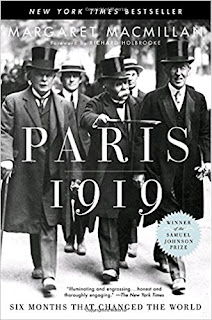Near the end of 1918 an armistice was signed ending the
main hostilities of what was then known as the Great War. During the first six
months of 1919, the victors met in Paris to draft the terms and conditions of
“the peace” which culminated in the Treaty of Versailles, signed on June 28,
1919, and several separate treaties.
History soon changed the narrative, marking the Treaty as the beginning
of the next war, and changing the war’s name from the “Great War” to World War
I, initiating a sad but convenient numbering system.
Paris 1919, by
Margaret MacMillan, is a scholarly, though readable, detailed documentation of
what happened at that peace conference. The book neither sets the blame for
World War II on the top negotiators, nor does it let them off the hook. In
fact, it goes to great length to underscore that top negotiators – U.S. President
Woodrow Wilson, British Prime Minister David Lloyd George, French Prime
Minister Georges Clemenceau, and to a lesser extent Italian Prime Minister
Vittorio Orlando -- knew that their grand plans were flawed documents,
acknowledging that the hype of a lasting peace guaranteed by a League of Nations sounded nice, but had little relevance to the facts on the ground.
These men basically redrew the maps of Europe, Africa, the Middle East, and
parts of East Asia, at times not even knowing where the countries in question
were, rather on what their inhabitant's thoughts on self-determination might be.
One cannot argue that “we, the world” paid a steep price for
many of these decisions, we have. Name a
21st century international “trouble spot” and you can trace it to
Paris 1919.
 For a history buff, this book is full of details with
MacMillan expertly dividing it between the personalities involved, and the geographic
regions being cut up. The personalities
involved, directly or indirectly, goes well beyond the primary Allied
negotiators, including the likes of: Franklin Roosevelt, Winston Churchill, and
Herbert Hoover early in their political careers, Mustafa Kemal Ataturk, Lawrence of Arabia,
Gertrude Bell, (to-be-King) Feisal, Chaim Weizmann, James Balfour, Joseph
Stalin and Vladimir Lenin, Lu Zhengxiang, Prince Saionji, Benito Mussolini, and viewing from the sidelines a
young man named Adolph Hitler; and many more – there were well over 1,000
official delegates at the conference, all leaders, or leaders-in-the-making. That MacMillan was able to connect the dots
in an understandable formula, was no small undertaking.
For a history buff, this book is full of details with
MacMillan expertly dividing it between the personalities involved, and the geographic
regions being cut up. The personalities
involved, directly or indirectly, goes well beyond the primary Allied
negotiators, including the likes of: Franklin Roosevelt, Winston Churchill, and
Herbert Hoover early in their political careers, Mustafa Kemal Ataturk, Lawrence of Arabia,
Gertrude Bell, (to-be-King) Feisal, Chaim Weizmann, James Balfour, Joseph
Stalin and Vladimir Lenin, Lu Zhengxiang, Prince Saionji, Benito Mussolini, and viewing from the sidelines a
young man named Adolph Hitler; and many more – there were well over 1,000
official delegates at the conference, all leaders, or leaders-in-the-making. That MacMillan was able to connect the dots
in an understandable formula, was no small undertaking.
Recommendation: Yes,
for history buffs, and required for history majors.
